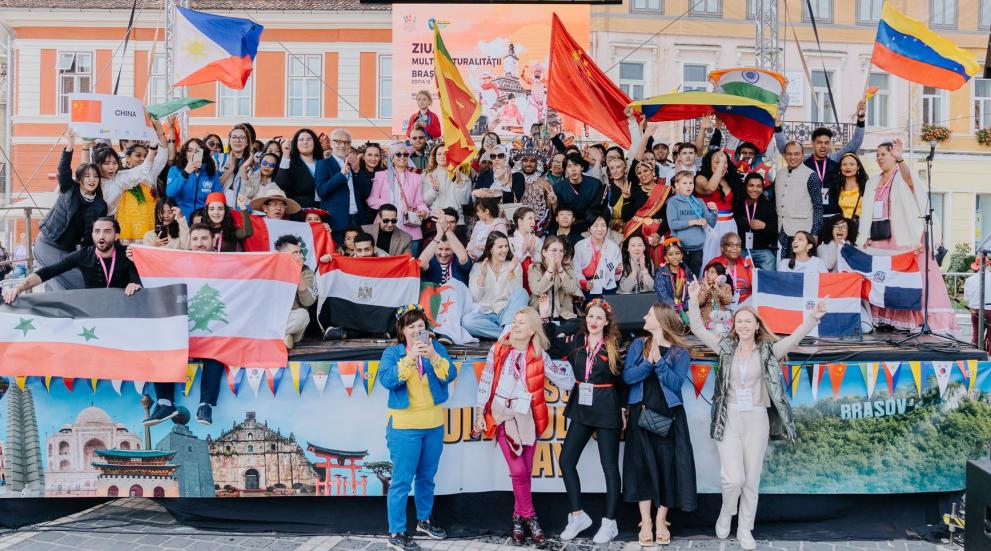
The Migrant Integration Centre Brașov (MIC) serves as a local resource providing a comprehensive range of services to immigrants in Brașov county in Romania. These include information, social and legal counselling, language training, social and cultural activities, psychological assistance, access to education, employment and health care, and accompaniment to local instituations.
Though the Migrant Integration Centre Brașov was initially set up to respond to the needs of refugees and immigrants who settled in the City of Brașov, it ended up playing a pivotal role at the local level in provision of humanitarian and cash assistance and, later, assistance for integration to people displaced from Ukraine. From March to June 2022, and from January to June 2023, in cooperation with Transilvania Bank, MIC developed a cash assistance programme supporting over 5 000 people displaced from Ukraine. It also succeeded in creating contacts with institutions and professionals from various fields (education, health, employment, social services, immigration office, local administration etc.) that proved essential later on, when organising reception and humanitarian assistance for people displaced from Ukraine. In order to reach refugees living outside the city of Brasov, MIC deployed in the field a mobile team, ensuring delivery of reliable information and essential assistance.

Source: Migrant Integration Centre Brasov, 2023
Project Goal
Most refugees and immigrants living in Brașov lack the language, social and cultural knowledge and connections to successfully navigate the complex institutional system that would allow them to access local community services and cultural events/to integrate in the local community.
A place that provides immigrants with information on different topics related to integration, counselling and support to access various services, as well as language training and the opportunities to meet and mingle in informal settings, alongside interpretation and accompaniment was the solution to the problem. However, engaging the local institutions in the process proved to be much more difficult than initially foreseen.
How it works
The Migrant Integration Centre Brașov involves paid staff from both local and migrant communities in providing refugees and other immigrants with information and a range of services (such as counselling, psychological assistance, language training & cultural orientation, accompaniment, referral to other service providers, etc.). These services are completed by diverse social, cultural and outdoor mixed activities that aim to bring together immigrants and locals to share food, music, sport and conversation. Moreover, the centre has for several years organised Brașov Multicultural Day, an annual event supported by the local municipality and other donors. This celebration, a hallmark of the Migrant Integration Centre Brasov, aims to educate, inspire, and celebrate cultural diversity. It brings together migrants residing in Brașov and in the neighboring towns - who are artists, performers, crafters - and numerous members of the public, fostering a rich exchange of cultures and experiences.
In order to keep abreast of the last developments in the field, the Migrant Integration Centre Brașov is involved in the Refugee Response Plan and in the Coalition for Migrant and Refugee Rights, closely working with public and private organisations, such as the Department for Emergency Situations and the General Inspectorate for Immigration, LOGS, the Romanian National Council for Refugees, etc.
Results
Results over the last 3 years (2021 – 2023):
- Approximately 6 000 refugees from Ukraine have been registered and provided with information, counselling, cash and humanitarian assistance.
- Approximately 800 TCNs have received different services to support their local integration.
- Over 500 people received Romanian language training structured on different knowledge levels.
- 2 editions of the Multicultural Day Festival were organised in 2022 and 2023, with over 300 refugees and immigrants involved in exhibitions and performances and more than 3 000 visitors.
- Through the advocacy actions and meetings on integration conducted prior to the outbreak of the ongoing war in Ukraine, local institutions have been made more accountable for their share of work related to immigrant integration, and have been prepared to take a more active role in assisting those displaced from Ukraine.
- The centre became an information point not only for the refugees and immigrants, but also for employers, local authorities, schools, and other community actors.
- Refugees and immigrants who benefited from MIC activities and services are better equipped to live in Romania. They have established a robust safety network of connections and social relationships that will serve as a crucial support system during any future crisis.
Evaluation
Though the Migrant Integration Centre Brașov was not comprehensively evaluated as a good practice model, some of the projects and services implemented under its brand have been evaluated as positive practices (e.g. Humanitarian Assistance for Refugees from Ukraine in Romania and Early Response for refugees from Ukraine, funded by Swiss Solidarity through Solidar Suisse, Protection Monitoring, Information Sharing and Individual Protection Assistance to Ukrainian Refugees in Brasov funded by the Danish Refugee Council, EMPATHY – Empowering Migrants Promoting Inclusion via Capacity Building and Communities Engagement, funded through ERASMUS + Programme, and Reviving the integration process of the foreigners from Brașov county funded through EEA & Norway Grants). In its Spotlight of Romania: Promising practices from the ground, a review of the actions initiated under the Refugee Response Plan in Romania, UNHCR identified the Migrant Integration Centre Brașov as a promising practice.
Who benefits
People displaced from Ukraine, people granted international protection and other immigrants living in Brașov county, Romania.
Funding and resources
Grants have been awarded from different sources (such as EU funds – AMIF, ERASMUS +, EEA & Norway Grants, local funds - Brasov Municipality funds for cultural projects), private donors (such as Swiss Solidarity, Danish Refugee Council, Solidar Suisse, Oxfam, Community Foundation Brasov, People in Need etc.), and donations from individuals.
About this good practice
- Geographic area
- Romania
- City
- Brasov
- Organisation
- The Romanian Association for Promotion of Quality and Successful Practices
- Website
- Contact person
- Astrid Hamberger
- Position
- President
Details
- Original source
- Posted by
